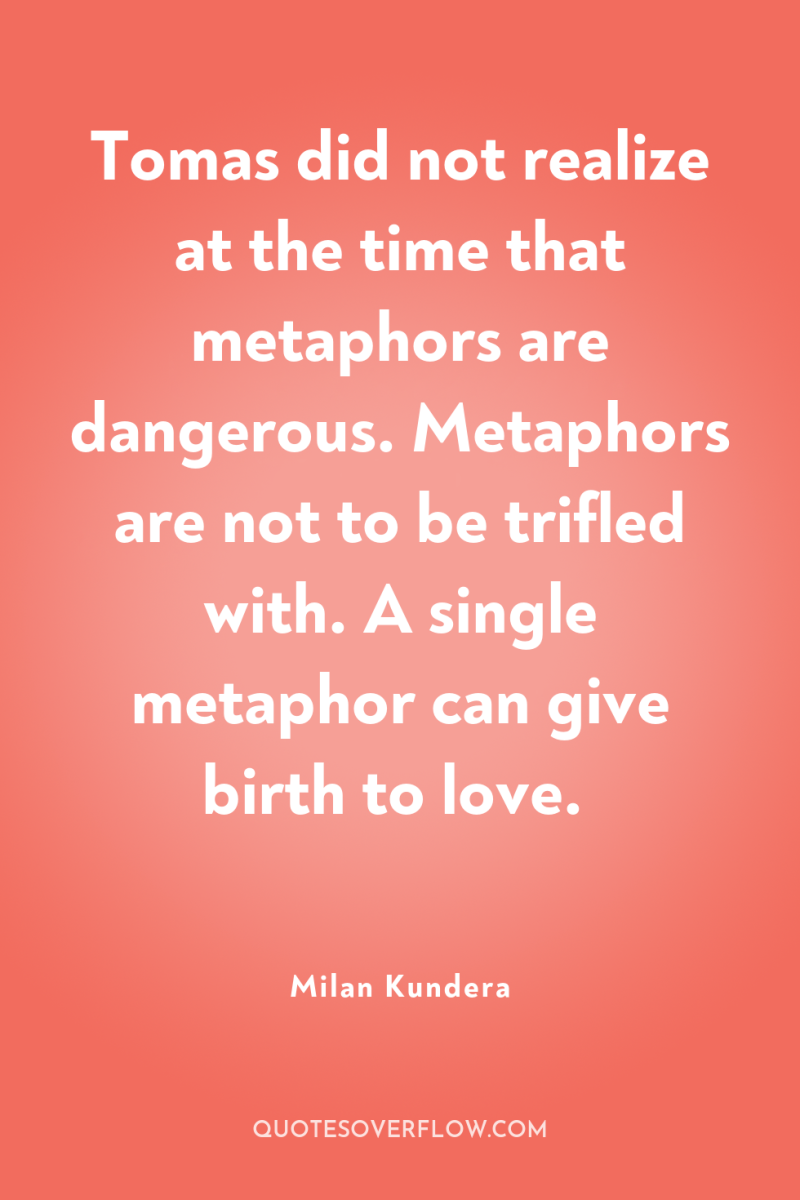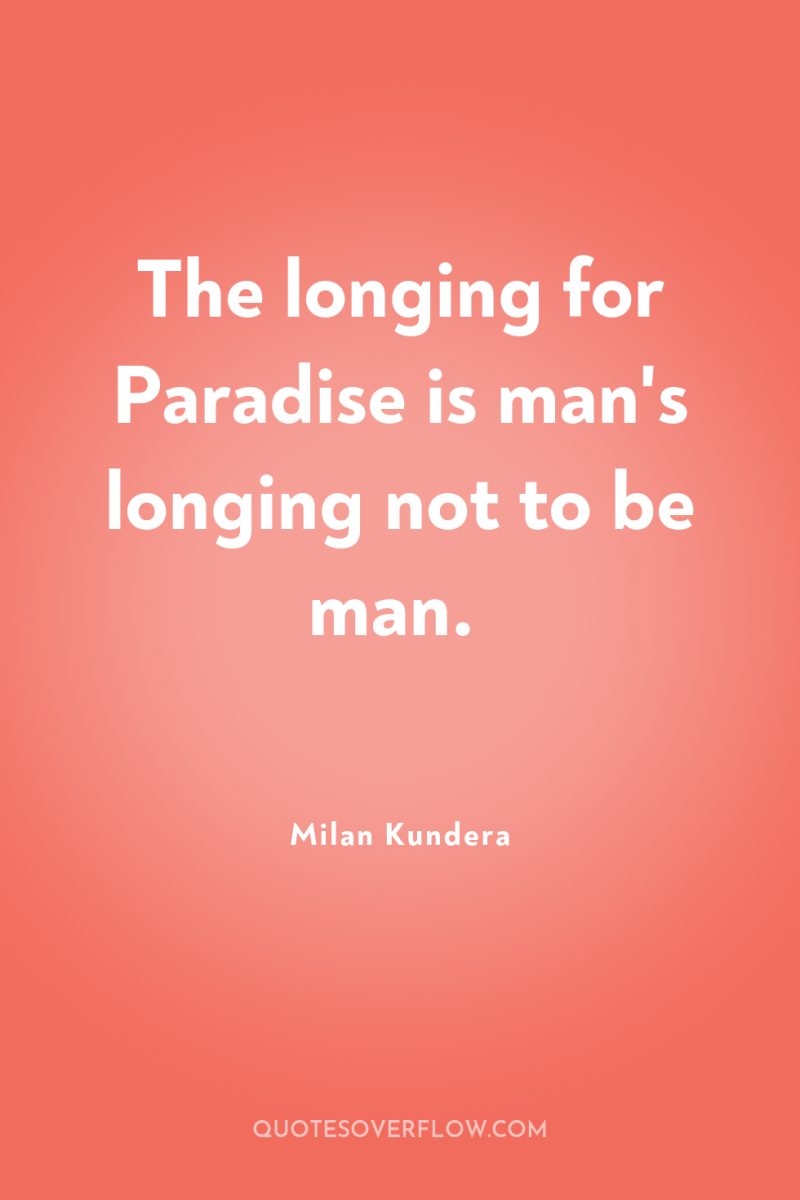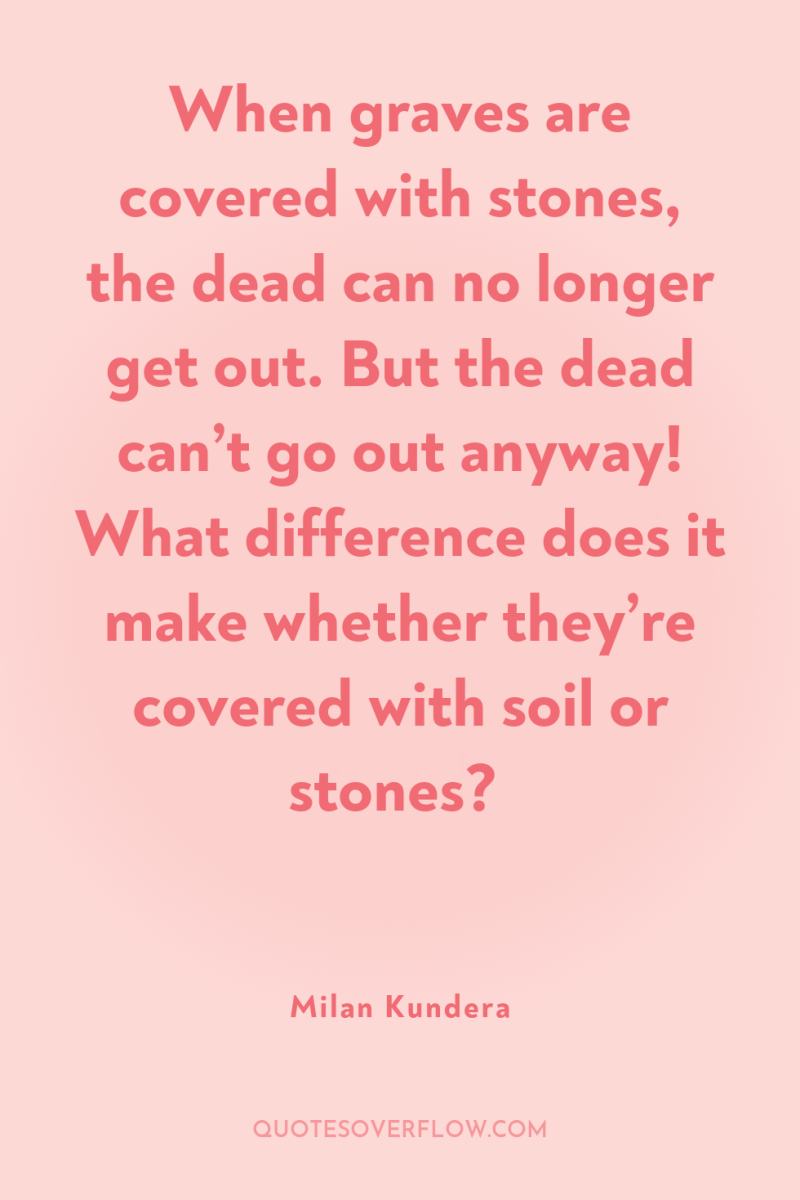1
Making love with a woman and sleeping with a woman are two separate passions, not merely different but opposite. Love does not make itself felt in the desire for copulation (a desire that extends to an infinite number of women) but in the desire for shared sleep (a desire limited to one woman).Milan Kundera
2
He suddenly recalled from Plato's Symposium: People were hermaphrodites until God split then in two, and now all the halves wander the world over seeking one another. Love is the longing for the half of ourselves we have lost.Milan Kundera
3
I want you to be weak. As weak as I am.Milan Kundera

4
Physical love is unthinkable without violence.Milan Kundera
5
Perhaps all the questions we ask of love, to measure, test, probe, and save it, have the additional effect of cutting it short. Perhaps the reason we are unable to love is that we yearn to be loved, that is, we demand something (love) from our partner instead of delivering ourselves up to him demand-free and asking for nothing but his company.Milan Kundera
6
Does he love me? Does he love anyone more than me? Does he love me more than I love him? Perhaps all the questions we ask of love, to measure, test, probe, and save it, have the additional effect of cutting it short. Perhaps the reason we are unable to love is that we yearn to be loved, that is, we demand something (love) from our partner instead of delivering ourselves up to him demand-free and asking for nothing but his company.Milan Kundera

7
Tomas did not realize at the time that metaphors are dangerous. Metaphors are not to be trifled with. A single metaphor can give birth to love.Milan Kundera
8
Einmal ist keinmal, says Tomas to himself. What happens but once, says the German adage, might as well not have happened at all. If we have only one life to live, we might as well not have lived at all.Milan Kundera

9
The longing for Paradise is man's longing not to be man.Milan Kundera
10
For Sabina, living in truth, lying neither to ourselves nor to others, was possible only away from the public: the moment someone keeps an eye on what we do, we involuntarily make allowances for that eye, and nothing we do is truthful. Having a public, keeping a public in mind, means living in lies.Milan Kundera

11
What does it mean to live in truth? Putting it negatively is easy enough: it means not lying, not hiding, and not dissimulating.Milan Kundera
12
Spontaneously, without any theological training, I, a child, grasped the incompatibility of God and shit and thus came to question the basic thesis of Christian anthropology, namely that man was created in God's image. Either/or: either man was created in God's image - and has intestines! - or God lacks intestines and man is not like him. The ancient Gnostics felt as I did at the age of five. In the second century, the Great Gnostic master Valentinus resolved the damnable dilemma by claiming that Jesus "ate and drank, but did not defecate." Shit is a more onerous theological problem than is evil. Since God gave man freedom, we can, if need be, accept the idea that He is not responsible for man's crimes. The responsibility for shit, however, rests entirely with Him, the creator of man.Milan Kundera

13
Dogs do not have many advantages over people, but one of them is extremely important: euthanasia is not forbidden by law in their case; animals have the right to a merciful death.Milan Kundera
14
Yes, it was too late, and Sabina knew she would leave Paris, move on, and on again, because were she to die here they would cover her up with a stone, and in the mind of a woman for whom no place is home the thought of an end to all flight is unbearable.Milan Kundera

15
When graves are covered with stones, the dead can no longer get out. But the dead can’t go out anyway! What difference does it make whether they’re covered with soil or stones?Milan Kundera

16
But isn't it true that an author can write only about himself?Milan Kundera
17
Anyone whose goal is 'something higher' must expect someday to suffer vertigo. What is vertigo? Fear of falling? No, Vertigo is something other than fear of falling. It is the voice of the emptiness below us which tempts and lures us, it is the desire to fall, against which, terrified, we defend ourselves.Milan Kundera
18
In Tereza’s eyes, books were the emblems of a secret brotherhood. For she had but a single weapon against the world of crudity surrounding her: the novels. She had read any number of them, from Fielding to Thomas Mann. They not only offered the possibility of an imaginary escape from a life she found unsatisfying; they also had a meaning for her as physical objects: she loved to walk down the street with a book under her arm. It had the same significance for her as an elegant cane from the dandy a century ago. It differentiated her from others.Milan Kundera
19
A young woman forced to keep drunks supplied with beer and siblings with cleanunderwear–instead of being allowed to pursue something higher –stores up greatreserves of vitality, a vitality never dreamed of by university students yawning over theirbooks. (..) The difference between the universitygraduate and the autodidact lies not so much in the extent of knowledge as in theextent of vitality and self-confidence. The elan with which Tereza flung herself into hernew Prague existence was both frenzied and precarious. She seemed to be expectingsomeone to come up to her any day and say, What are you doing here? Go back whereyou belong!.Milan Kundera
20
Kitsch is the aesthetic ideal of all politicians and all political parties and movements. Those of us who live in a society where various political tendencies exist side by side and competing influences cancel or limit one another can manage more or less to escape the kitsch inquisition: the individual can preserve his individuality; the artist can create unusual works. But whenever a single political movement corners power, we find ourselves in the realm of totalitarian kitsch.Milan Kundera

21
To rebel against being born a woman seemed as foolish to her as to take pride in it.Milan Kundera
22
Noise has one advantage. It drowns out words. And suddenly he realized that all his life he had done nothing but talk, write, lecture, concoct sentences, search for formulations and amend them, so in the end no words were precise, their meanings were obliterated, their content lost, they turned into trash, chaff dust, sand; prowling through his brain, tearing at his head. they were his insomnia, his illness. And what he yearned for at that moment, vaguely, but with all his might, was unbounded music, absolute sound, a pleasant and happy all-encompassing, over-poering, window-rattling din to engulf, once and for all, the pain, the futility, the vanity of words. Music was the negation of sentences, music was the anti-word! .Milan Kundera
23
When the heart speaks, the mind finds it indecent to object.Milan Kundera
24
Between the approximation of the idea and the precision of reality there was a small gap of the unimaginable, and it was this hiatus that gave him no rest.Milan Kundera
25
He had come to find out that reality was more than a dream, much more than a dream!Milan Kundera
26
The brain appears to possess a special area which we might call poetic memory and which records everything that charms or touches us, that makes our lives beautiful. From the time he met Tereza, no woman had the right to leave the slightest impression on that part of his brain. Tereza occupied his poetic memory like a despot and exterminated all other trace of other women. That was unfair, because the young woman he made love to on the rug during the storm was not a bit less worthy of poetry than Tereza. She shouted, ‘Close your eyes! Squeeze my hips! Hold me tight! ; she could not stand it that when Tomas made love he kept his eyes open, focused and observant, his body ever so slightly arched above her, never pressing against her skin. She did now want him to study her. She wanted to draw him into the magic stream that may be entered only with closed eyes. [.] She wanted to merge with him. [.] 'It’s not sensual pleasure I’m after, ’ she would say, 'it’s happiness. And pleasure without happiness is not pleasure.’ In other words, she was pounding on the gate of his poetic memory. But the gate was shut. There was no room for her in his poetic memory. There was room for her only on the rug. .Milan Kundera
27
Indeed, the only truly serious questions are ones that even a child can formulate. Only the most naive of questions are truly serious. They are the questions with no answers. A question with no answer is a barrier that cannot be breached. In other words, it is questions with no answers that set the limit of human possibilities, describe the boundaries of human existence.Milan Kundera
28
Vertigo is something else than the fear of falling. It is the voice of emptiness below us which temps and lures us, it is the desire to fall, against which, terrified, we defense ourselves.Milan Kundera
29
Let the planet be convulsed with exploding bombs, the country ravished daily by new hordes, all his neighbors taken out and shot - he could accept it all more easily than he dared to admit. But the grief implicit in Tereza's dream was something he could not endure.Milan Kundera
30
Horror is a shock, a time of utter blindness. Horror lacks every hint of beauty. All we can see is the piercing light of an unknown event awaiting us. Sadness, on the other hand, assumes we are in the know... The light of horror thus lost its harshness, and the world was bathed in a gentle, bluish light that actually beautified it.Milan Kundera
31
Our dreams prove that to imagine - to dream about things that have not happened - is among mankind's deepest needs.Milan Kundera
32
For there is nothing heavier than compassion. Not even one's own pain weighs so heavy as the pain one feels with someone, for someone, a pain intensified by the imagination and prolonged by a hundred echoes.Milan Kundera
33
By revealing to Tomas her dream about jabbing needles under her fingernails, Tereza unwittingly revealed that she had gone through his desk. If Tereza had been any other woman, Tomas would never have spoken to her again. Aware of that, Tereza said to him, Throw me out! But instead of throwing her out, he seized her hand and kissed the tips of her fingers, because at that moment he himself felt the pain under her fingernails as surely as if the nerves of her fingers led straight to his own brain. Anyone who has failed to benefit from the Devil’s gift of compassion (co-feeling) will condemn Tereza coldly for her deed, because privacy is sacred and drawers containing intimate correspondence are not to be opened. But because compassion was Tomas’s fate (or curse), he felt that he himself had knelt before the open desk drawer, unable to tear his eyes from Sabina’s letter. He understood Tereza, and not only was he incapable of being angry with her, he loved her all the more.Milan Kundera
34
Is not an event in fact more significant and noteworthy the greater the number of fortuities necessary to bring it about? ... Everything that occurs out of necessity, everything expected, repeated day in and day out, is mute. Only chance can speak to us.Milan Kundera
35
What we have not chosen we cannot consider either to our merit or our failure.Milan Kundera
36
There was not a scrap of tangible evidence to show that he had spent the most wonderful year of his life with her. Which only increased his desire to remain faithful to her.Milan Kundera
37
The idea of eternal return is a mysterious one, and Nietzsche has often perplexed other philosophers with it: to think that everything recurs as we once experienced it, and that the recurrence itself recurs ad infinitum! What does this mad myth signify?Milan Kundera
38
They had been talking about his friend Z. when she announced, "If I hadn't met you, I'd certainly have fallen in love with him." Even then, her words had left Tomas in a strange state of melancholy, and now he realized it was only a matter of chance that Tereza loved him and not his friend Z. Apart from her consummated love for Tomas, there were, in the realm of posÂsibility, an infinite number of unconsummated loves for other men. We all reject out of hand the idea that the love of our life may be something light or weightless; we presume our love is what must be, that without it our life would no longer be the same; we feel that Beethoven himself, gloomy and awe-inspirÂing, is playing the "Es muss sein! " to our own great love. Tomas often thought of Tereza's remark about his friend Z. and came to the conclusion that the love story of his life exemplified not "Es muss sein! " (It must be so), but rather "Es konnte auch anders sein" (It could just as well be otherwise).Milan Kundera
39
She had experienced something beautiful, and he had failed to experience it with her. The two ways in which their memories reacted to the evening storm sharply delimit love and non-love.Milan Kundera
40
Loves are like empires: when the idea they are founded on crumbles, they too, fade away.Milan Kundera
41
As I have pointed out before, characters are not born like people, of woman; they are born of a situation, a sentence, a metaphor containing in a nutshell a basic human possibility that the author thinks no one else has discovered or said something essential about. But isn't it true that an author can write only about himself?Milan Kundera
42
As I have pointed out before, characters are not born like people, of woman; they are born of a situation, a sentence, a metaphor containing in a nutshell a basic human possibility that the author thinks no one else has discovered or said something essential about.Milan Kundera
43
Tereza's mother never stopped reminding her that being a mother meant sacrificing everything. Her words had the ring of truth, backed as they were by the experience of a woman who had lost everything because of her child. Tereza would listen and believe that being a mother was the highest value in life and that being a mother was a great sacrifice. If a mother was Sacrifice personified, then a daughter was Guilt, with no possibility of redress. .Milan Kundera
44
In modern times an idea can be refuted, yes, but not retractedMilan Kundera
45
It is a tragicomic fact that our proper upbringing has become an ally of the secret police. (...) The "Tell the truth! " imperative drummed into us so automatically that we feel ashamed of lying even to a secret policeman.Milan Kundera
46
Whether they knew of didn't know is not the main issue; the main issue is whether a man is innocent because he didn't know. (...) by beating himself on the chest and proclaiming, "My conscience is clear! I did not know! I was a believer! " Isn't his "I did not know I was a believer! " at the very root of his irreparable guilt?Milan Kundera
47
True human goodness, in all its purity and freedom, can come to the fore only when its recipient has no power. Mankind's true moral test, its fundamental test (which is deeply buried from view), consists of its attitude towards those who are at its mercy: animals.Milan Kundera
48
For Sabina, living in truth, lying neither to ourselves not others, was possible only away from the public: the moment someone keeps an eye on what we do, we involuntarily make allowances for that eye, and nothing we do is truthful. Having a public, keeping a public in mind, means living in lies. Sabina despised literature in which people give away all kinds of intimate secrets about themselves and their friends. A man who loses his privacy loses everything, Sabina thought. And a man who gives it up on his own free will is a monster. That is why Sabina did not suffer in the least from having to keep her love a secret. On the contrary, only by doing so could she live the truth. .Milan Kundera
49
Metaphors are dangerous. Metaphors are not to be trifled with. A single metaphor can give birth to loveMilan Kundera
50
There is no particular merit in being nice to one's fellow man.. We can never establish with certainty what part of our relations with others is a result of our emotions - love apathy, charity of malice - and what part is predetermines by the constant power play among individuals. True human goodness, in all its purity and freedom, can come to the fore only when its recipient has no power. Mankind's true moral test, its fundamental test (which lies deeply buries from view), consists of attitude towards those who are at its mercy: animals. And in this respect mankind has suffered a fundamental débâcle, a débâcle so fundamental all others stem from it.Milan Kundera